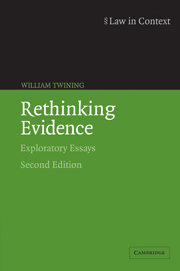Book contents
- Frontmatter
- Contents
- Preface
- Acknowledgements
- List of abbreviations
- Table of cases
- 1 Introduction: the story of a project
- 2 Taking facts seriously
- 3 The Rationalist Tradition of evidence scholarship
- 4 Some scepticism about some scepticisms
- 5 Identification and misidentification in legal processes: redefining the problem
- 6 What is the law of evidence?
- 7 Rethinking Evidence
- 8 Legal reasoning and argumentation
- 9 Stories and argument
- 10 Lawyers' stories
- 11 Narrative and generalizations in argumentation about questions of fact
- 12 Reconstructing the truth about Edith Thompson the Shakespearean and the jurist
- 13 The Ratio Decidendi of the Parable of the Prodigal Son
- 14 Taking facts seriously – again
- 15 Evidence as a multi-disciplinary subject
- Bibliography
- Index
9 - Stories and argument
Published online by Cambridge University Press: 15 December 2009
- Frontmatter
- Contents
- Preface
- Acknowledgements
- List of abbreviations
- Table of cases
- 1 Introduction: the story of a project
- 2 Taking facts seriously
- 3 The Rationalist Tradition of evidence scholarship
- 4 Some scepticism about some scepticisms
- 5 Identification and misidentification in legal processes: redefining the problem
- 6 What is the law of evidence?
- 7 Rethinking Evidence
- 8 Legal reasoning and argumentation
- 9 Stories and argument
- 10 Lawyers' stories
- 11 Narrative and generalizations in argumentation about questions of fact
- 12 Reconstructing the truth about Edith Thompson the Shakespearean and the jurist
- 13 The Ratio Decidendi of the Parable of the Prodigal Son
- 14 Taking facts seriously – again
- 15 Evidence as a multi-disciplinary subject
- Bibliography
- Index
Summary
Once upon a time, the French philosopher, Paul Ricouer, visited the University of Warwick. His legacy was a long-running workshop in the mid-1980s on ‘Narrative as an instrument of culture’. The organizers divided academic disciplines into three rough categories: ‘Not Obvious’, such as literature, history, and theology; and ‘In-between’, including law, anthropology and sociology.
They began with ‘Not Obvious’ and invited scholars from disciplines in that category to give seminars. Whether or not they had thought about it before, the contributors found story-telling playing various roles in each field. For example, a philosopher of science, Rom Harré, reported how scientific journals rarely give a realistic account of the story of an experiment (‘Milly sneezed and knocked over the Bunsen burner’, or ‘how we coped when the grant ran out’); rather, they often gave a quite fulsome account of the life story of the Principal Researcher, there by lending authority to the findings.
When they turned to law, they decided to invite Lord Denning, the most famous judge of his day, who was well known both as a raconteur and for vivid evocations of the facts of cases in his judgments. The invitation did not disdain flattery. It read in effect: ‘Dear Lord Denning, We believe you to be the greatest legal story-teller of your generation. Will you please come to Warwick to tell us your secret(s).’
- Type
- Chapter
- Information
- Rethinking EvidenceExploratory Essays, pp. 280 - 285Publisher: Cambridge University PressPrint publication year: 2006

